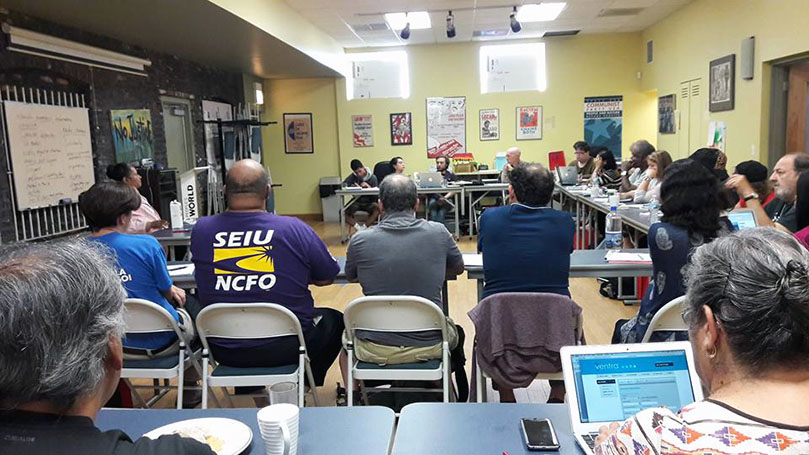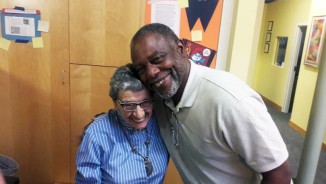
I encountered the familiar skepticism before the plane took-off. “You’re doing what? With who?” Yes, I was traveling halfway across the country to Chicago, the Windy City, to attend CPUSA’s annual National School. The same CPUSA as in, “Are you now or have you ever been a member of . . .”
To be sure, I too had my own fair share of skepticism. Was what I was doing even legal? Last I’d heard, CPUSA party members were put on blast in Hollywood, blacklisted across the country, and cast into the dustbin of history thanks to the Cold War. Given the collapse of the Soviet Union, I wasn’t even sure the party still existed. Yet here I was, on an airplane descending into Chicago O’Hare, eagerly and anxiously awaiting what the week would bring.
Check out this testimonial from Flavio, one of the students:
I’d graduated from college only a few months before, and felt truly excited to be heading back to school; albeit this time, tuition-free. Chicago in late August proved hot, muggy, and rainy. Walking along the sidewalks to my housing assignment (the Party provided room and board), I began to appreciate that Chicago is the city of the Haymarket Massacre, the place that gave the world May Day. The Martyrs of Haymarket inspired and urged to action working people the world over; I walked on hallowed ground.
I’d been involved in labor activism during my time at university, participating in our local Living Wage Campaign, though it was community engagement during my Catholic school years that had initially raised my social consciousness. I always remembered learning about CPUSA during the Depression years, and the vital contributions they’d made to all facets of American life in that dark time. The case of the Scottsboro Boys always stood out the starkest. How had this political group been that far ahead of the times? Indeed, throughout that period, CPUSA seemed to me the only group that was on “the right side of History,” so to speak. This legacy squashed my ambivalence and landed me in Illinois.
I arrived at the housing arrangement, the Parthenon Hostel, before the rest of my roommates. The Parthenon stood just west of downtown Chicago, in the neighborhood known as “Greektown,” a short bus ride from the Unity Center where the school was to be held. I ended up falling asleep before a
nybody else arrived, excitedly looking forward to meeting my fellow  students. We all met for the complimentary breakfast downstairs the morning after, on our first day of school. There I encountered my first surprise: the sheer diversity of my soon-to-be classmates not just with respect to race and gender, but age, lifestyle, and professional background too. Fresh out of 16 years of American schooling, where one’s peers typically are of a similar background and an identical age, I already knew I was in for an educational experience unlike any I’d known thus far: Diverse humans, a new type of student body, bringing a plethora of experience, an abundance of human data. We all made our way to the bus stop together. Stories shared between us all cultivated a sense of togetherness. I’d joined the Party not but a month earlier. Another shared his experiences from the infamous 1992 convention. A third reflected on how Chicago had changed in the short time since the National Party Convention two years earlier. Each brought their own stories from their participation in democratic struggles, some with over 20, 30, or 40 years of experience; yet now we were all peers, happy to be on equal footing, there to learn.
students. We all met for the complimentary breakfast downstairs the morning after, on our first day of school. There I encountered my first surprise: the sheer diversity of my soon-to-be classmates not just with respect to race and gender, but age, lifestyle, and professional background too. Fresh out of 16 years of American schooling, where one’s peers typically are of a similar background and an identical age, I already knew I was in for an educational experience unlike any I’d known thus far: Diverse humans, a new type of student body, bringing a plethora of experience, an abundance of human data. We all made our way to the bus stop together. Stories shared between us all cultivated a sense of togetherness. I’d joined the Party not but a month earlier. Another shared his experiences from the infamous 1992 convention. A third reflected on how Chicago had changed in the short time since the National Party Convention two years earlier. Each brought their own stories from their participation in democratic struggles, some with over 20, 30, or 40 years of experience; yet now we were all peers, happy to be on equal footing, there to learn.
We came together to interpret the world, and redoubled our dedication to what mattered, changing it.
We arrived at the Unity Center in the heart of the Bridgeport neighborhood. One immediately got the sense of what we were all getting ourselves in to. Artworks adorned the wall, each dedicated to the working people’s democratic struggles. Political posters from campaigns throughout the twentieth century hung throughout, offering the tangible sense of History all around us. People’s World, the nonagenarian, partisan publication dedicated to working people, shared the building. It was as though the school was being held in the epicenter of this country’s labor movement.
School began with introductions, but not much time had passed before we began to open up to one another. We shared our backgrounds, where we had come from, then moved onto a more pressing, personal question: How has capitalism affected you and your life? This introspective, provocative question no doubt set the tone for the rest of our week.
Check out testimonial from Darren, another student:
The days flew by. Much like one’s experience in elementary school, we rose together, ate together, recessed together, and, most importantly, learned from one another. Classes ranged from subjects as an Introduction to Dialectics to the LGBT Struggle for Equality, with every imaginable subject pertinent to Marxist thought covered. I’d studied Marx’s work in college, but nothing I’d experienced came close to this practical engagement with real people. Each of us had taken Marx’s exhortation to heart: We came together to interpret the world, and redoubled our dedication to what mattered, changing it.
We each came away with something more though. Sure, we now had critical tools, political tactics, strategies, and theory to boot, but a real spirit of camaraderie organically arose among us. We read poetry to each other, shared life stories, and lifted up one another. This place marked a respite from the travails we all faced on a daily basis in our atomized, quotidian lives in capitalist society. We understood each other, and ourselves, with the help of the group in such a way that truly, actually, renewed and rejuvenated us.
All this came to a head in our final evening at the school. We were told a special visitor was coming. Bea Lumpkin, the living legend who had just celebrated her 98 birthday, came to speak to us and celebrate. She spoke of her lifetime involved in the Party, and, especially of the sheer joy that had graced her life of struggle. Nothing short of inspirational, Bea personified the camaraderie we’d all felt forming. More than ever, I now understood why we addressed one another as comrade.
I left the school excited, revitalized. We each splintered off back to whence we’d came. New friends, new understandings, new tools: We left armed, ready to change the world, dedicated to the struggle for the more just society history challenged us all to create.


 Join Now
Join Now